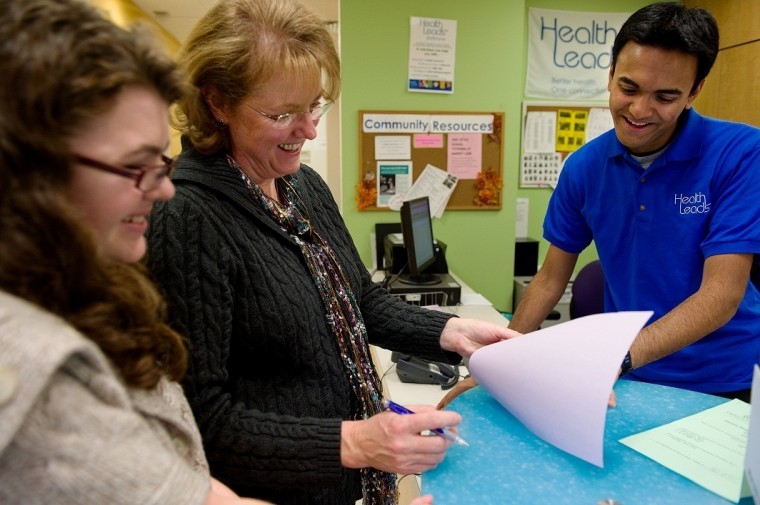Health Leads came to UMass Boston in the first week of October to recruit student volunteers and interns to work at the Codman Square Health Center in Dorchester. The organization places college students in local clinics and hospitals where they help clients facing poverty and other obstacles to get needed services, including insurance coverage, daycare, and food pantry assistance.
The nationwide program operates in six cities, with its headquarters in Boston. UMass Boston students will join those from Harvard and BU already working with the program in the Codman Square Health Center this year. It is possible to receive class credit for the work, depending on the student’s program or major.
Mark Marino is the current executive director of Health Leads Boston, as well as the founder of Health Leads Baltimore. He’s excited to start working with UMass this fall, and he sees participation in Health Leads as a way for UMass students to get involved in their local community. He’s proud to say that Health Leads is “the first UMass Boston program to put students to work at a Dorchester medical center.”
It’s also a great way to explore a career in healthcare. “There aren’t too many opportunities to really get involved with one-on-one patient care as an undergrad,” Marino points out. He claims the program offers students “fairly rigorous training” and “exposure and experience so that they know if this is a type of setting that would suit them,” making it perfect for pre-med and nursing students.
Marino describes Health Leads as putting a “social justice lens on healthcare delivery,” and the students he wants to work with are interested in social justice, no matter what they study in school. The ideal applicant is “anyone who has a commitment to service–everyone from art history majors to sociology and anthropology majors to the more traditional pre-med students.” People with no experience are welcome and will be trained. “Particularly if they have demonstrated an appetite to learn,” Marino says, “we are absolutely willing to work with them.”
The hours of the program are extremely flexible. A minimum commitment is about six hours a week: one three-hour shift at the Codman Square Health Center and three hours follow-up, communicating and meeting with other UMass Boston participants. At the same time, Marino would like a few students who are willing to donate extra time and energy to the program. “As a startup at UMass Boston, we’re looking for students to really help start the program on campus.” These students would recruit others and give Health Leads administrators advice on what does and does not work for UMass students. The organization also encourages students with the time to volunteer for multiple shifts, so that some volunteers spend as much as twelve hours a week in the healthcare setting.
Marino says the question he’s asked most often is whether students can be effective at delivering services to low-income people. “Students are the best workforce to do this kind of work,” he answers. “I think we’ve demonstrated time and time again that students are extremely well-equipped.” He says the program’s participants are happy with the difference they are able to make in the lives of low-income Bostonians seeking healthcare: “It’s a very empowering opportunity.”





















































